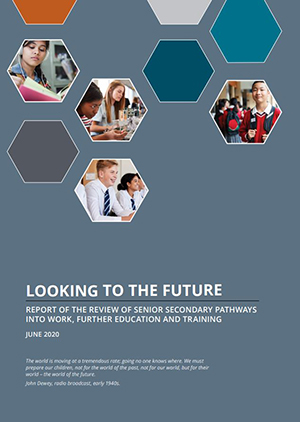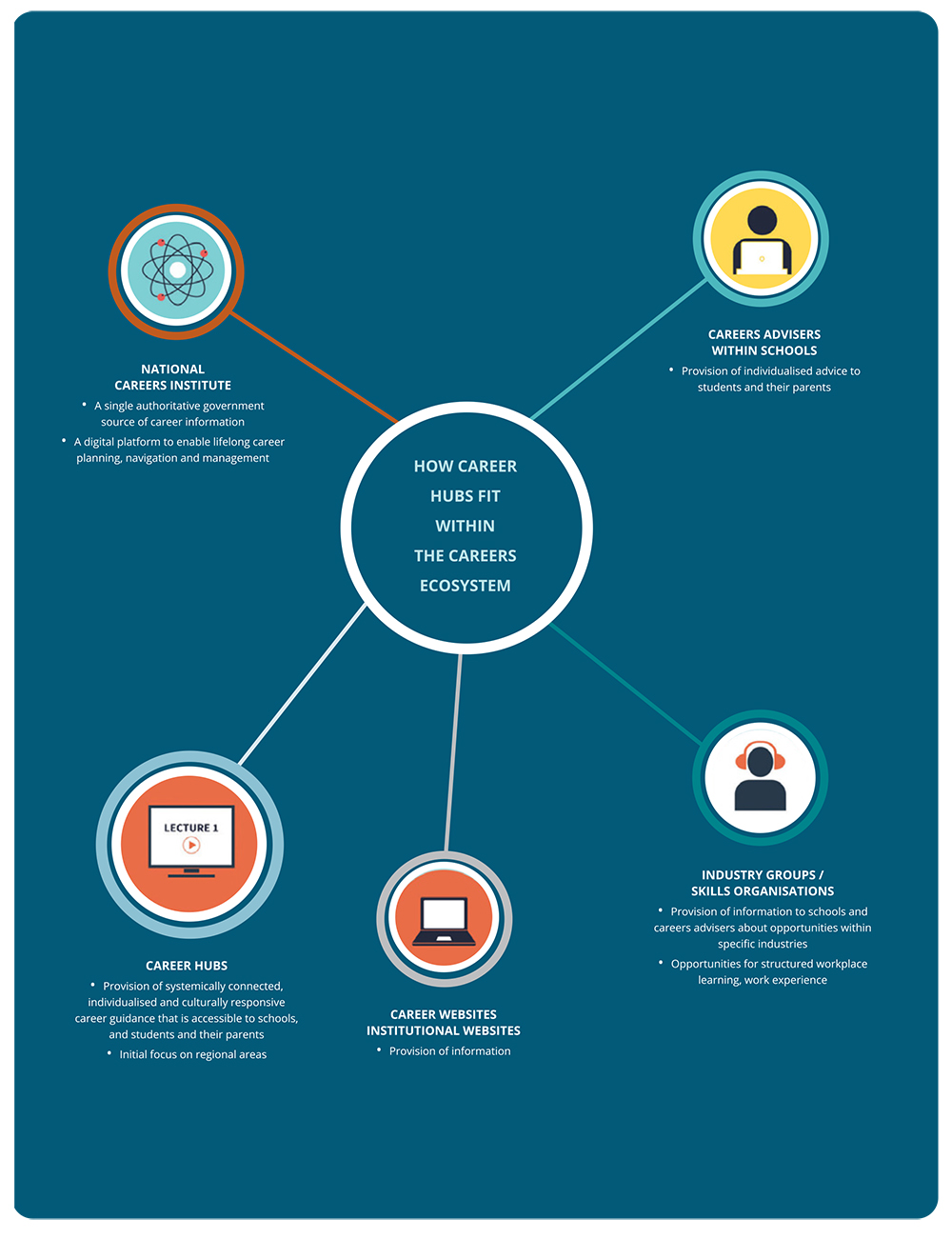Looking to the Future of Career Development
08/09/20
Peter Shergold, Chancellor of Western Sydney University and Chair of the NSW Education Standards Authority, recently chaired a Review of senior secondary schooling for the COAG Education Council.

Earlier this year I chaired a Review of senior secondary schooling for COAG’s Education Council. Entitled Looking to the Future, the report was delivered in June and is now available for public discussion here.
It was clear to Review panel members that too few students are well-prepared to make informed choices about their future careers. Partly this is because a university ranking tool, ATAR, now tends to dominate students’ preparations for their higher school certificates. Academic pathways and subject options are generally privileged compared to vocational ones. Higher status is accorded academic achievement. Educational and training choices often bear little relationship to the skill needs emerging in the labour market.
This unfortunate situation is compounded by the fact that, with notable exceptions, the career guidance and assistance provided to students and their parents is limited. Often success depends upon the competence and enthusiasm of a particular teacher who agrees to take on the responsibility as an addition to their teaching load. A few may have specialised in career education as part of their education degree. Most have not.
Generally, a teacher’s own personal knowledge and experience is limited to university. Even where school jurisdictions have instigated a career pathway program, its implementation is too often of a tick-a-box quality. My sense is that whilst the level of pastoral care at schools has improved significantly in the last 15 years, the overall quality of career guidance has declined commensurately.
Given the widening impact of cognitive technologies both on trades and professions, and the immediate adverse consequences of COVID-19 on young people’s labour market prospects, this is disastrous. Our Review recommends that career guidance should be strengthened within and outside schools and accorded a higher status in educating young people for an increasingly uncertain future. Students need to be better prepared, both in terms of employment and active citizenship. Wide ranging career guidance is essential.
According to the Foundation for Young Australians, 63 per cent of students feel that they do not have enough information about post-school options. A 2018 survey for Youth Sense found that 49 per cent of students believed that they had a good understanding of the university pathway but only 16 per cent had a similar knowledge of other pathways such as vocational education, apprenticeships and traineeships.
Students generally find the information made available to them a confusing maze. They prefer to know about the range of industry opportunities rather than just be recommended a university or TAFE course. They also crave detail: how do I apply for a job, how do I prepare a resume, how can I perform better at interviews, how can I identify and evidence my skills development?
We need career professionals, with certificated qualifications, to provide young people with advice and mentoring. Whilst some schools may have the resources and commitment to do this within the classroom, it may be better to deliver higher quality individualised support to students through a network of careers advisors located outside the school. Sometimes advisers might visit schools; sometimes students may prefer to visit them.
Figure 8: Proposed career ecosystem

Such a network would have a number of advantages. Many students prefer the idea of talking in confidence to a trusted advisor outside the school who will not start a career discussion with the same preconceptions of their interests and abilities as their teachers. Such networks may also have far more capacity to engage local employers in delivering real-world experience and identifying the diversity of occupational opportunities available.
This advisor network could usefully be supported by the newly established National Careers Institute. Hopefully, the Institute will develop a free and comprehensive digital platform for the dissemination of authoritative career information. But advisors will still be needed to help students, teachers and parents to navigate the site’s complexities. Simply having the Commonwealth government provide a new careers website is unlikely to meet student requirements: indeed, student who are less digitally-savvy are likely to find themselves further disadvantaged.
The most exciting prospect is to create a network of career advisers able to support people as they progress through a lifetime of learning. Some teachers have told me that there is a value in starting to talk about the world of work to students even in primary school. More intensive guidance, coaching and mentoring could then be provided throughout senior secondary school. The focus should be on helping students to identify transferable employability attributes for the future - such as complex problem solving, collaboration, effective communication and creativity – rather than just providing them with advice on the technical knowledge required of a particular trade or profession today.
As students enter the tertiary sector and/or find jobs and build careers, they may need to be further supported at intervals throughout their adulthood. Some jobs will disappear, new ones will emerge and the skill sets of many occupations will alter profoundly.
Increasingly, competencies will be gained outside of the Australian Qualifications Framework, through an increasing diversity of employer-based microcredentials, captured as digital badges. Professional development is likely to be transformed. Career advisors will have a crucial role to play.
If we are to take seriously the prospect of learning for life, then that bold ambition needs to be accompanied by the provision of a comprehensive and universal career service for life. Through such interventions, governments could significantly improve labour market mobility and provide the emerging skills upon which Australia’s future economic prosperity will depend.
But, even if we embrace the public purpose of lifetime career development, at its centre sit young people. The can feel overwhelmed as they face the stress and challenge of ‘deciding’ their future. They need and deserve professional help as they start their journey. It is time to declare, no if or buts, that all high school students (and their anxious parents) have a right to receive professional career guidance at school.